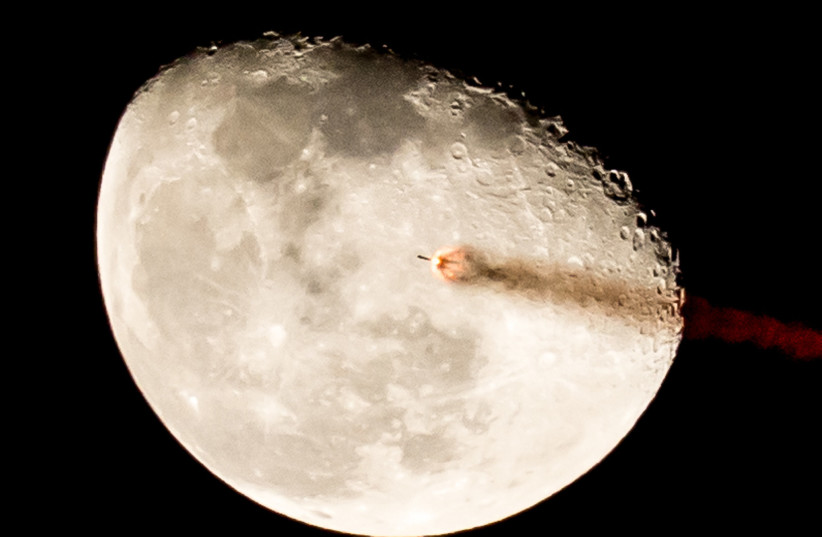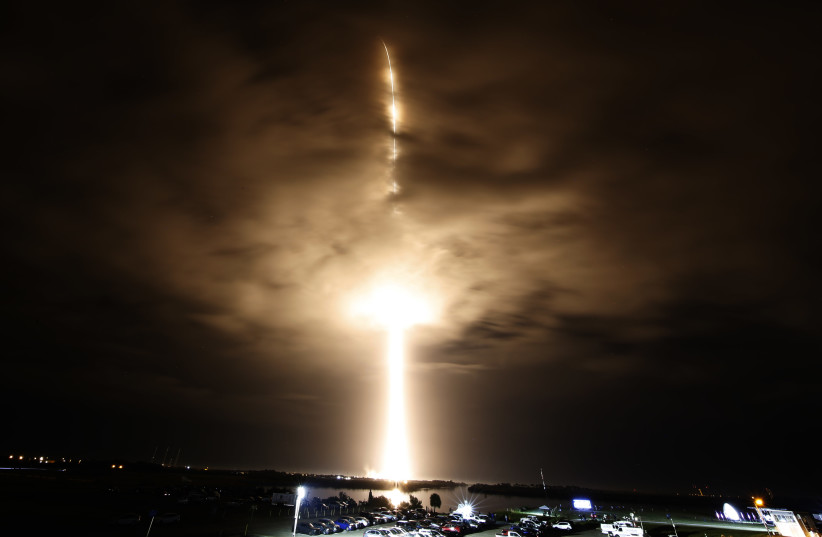A SpaceX Falcon 9 rocket is going where no uncontrolled rocket has gone before: Face-first into the surface of the Moon, according to predictions from astronomers.
The rocket itself was launched into orbit way back in 2015. At the time, it was being used to launch NASA's Deep Space Climate Observatory (DSCOVR), which was accomplished. The observatory now continues to orbit the Earth from the L1 Lagrange point.
But the rocket remained in orbit after it disengaged from the observatory. Now, that orbit is setting it on a direct collision course with the Moon.
Independent researcher Bill Gray was the first to publicize this fact, and provided calculations that it would likely impact the Moon slightly north of the lunar equator at approximately 7:26 a.m. EST on March 4, but this may change as the time to the impact gets closer.
"Right now, we can't get more data because the object is quite close to the sun in the sky. On February 7 and 8, we'll have a brief opportunity to look at it and will get more data, and the above time and location will be better determined," Gray told CNN via email.

Since then, other astronomers have corroborated Gray's claims, and NASA has said that they are tracking the rocket.
<br>Is this unusual?
This would not be the first time a rocket has crashed into the Moon. In fact, many missions see spacecrafts and rockets intentionally sent to crash into the Moon at the end of the mission.
This, in itself, is understandable.
Space debris, garbage left around in space by humans, is an ever-growing problem.
This is because it crowds space as it gets caught in orbit, posing danger to satellites and space stations and runs the risk of coming back down to Earth.
What is the safest way to avoid that? According to European Space Agency (ESA) space debris office head Holger Krag, the answer is crashing it into the Moon, as that is the best way to make sure it won't one day return to Earth.

What makes this rocket different?
The big difference is that unlike the aforementioned crashes, this one is wholly unintentional and uncontrollable.
Speaking to the BBC, astronomer Prof. John McDowell of the Harvard-Smithsonian Center for Astrophysics, this is the first known uncontrolled rocket collision with the Moon.
However, this isn't the only bit of space debris like this wandering space. According to McDowell, there are maybe 30-50 of them out there, but no one systematically monitors and tracks space debris that is so far out into space.
That's why it's likely that other space debris has hit the moon by accident, and we've just never noticed.
"Thanks to Bill Gray and a few other people who have spent their own time keeping track of the space junk that's too far out for [the US Space Force] to care about, we can now spot events like this," McDowell noted on his blog.
"Amazingly it is no one's paid job to do. SpaceX haven't paid attention to the object since Feb 2015, and neither has NASA or anyone else official."
It is for this reason that one should not be blaming SpaceX, the space-tech company founded by Elon Musk, for the impending crash.
"This is not 'SpaceX did something bad' - it's perfectly standard practice to abandon stuff in deep orbit - this is 'none of the space agencies care about leaving stuff out beyond the
Moon,'" McDowell wrote.
<br>What will happen to the Moon?
It will explode.
"It's basically a four-ton empty metal tank, with a rocket engine on the back. And so if you imagine throwing that at a rock at 5,000 miles an hour, it's not going to be happy," McDowell told the BBC.
But will it cause any damage? Beyond forming a small crater, no.
The Moon is massive. For comparison, if one were to combine the masses of every single asteroid in the asteroid belt, the Moon would still be denser and have greater mass. A four-ton rocket crashing into it won't do anything severe to it.
In fact, as McDowell explained, there likely won't be anything new that scientists could learn from the impending crash.
It will be very hard to see it at all, regardless.
Calculations say that the rocket will hit the far side of the Moon, which can't really be scene from Earth.
Most satellites orbiting the Moon like the Lunar Reconnaissance Orbiter will be in low orbits, and likely far from the specific spot needed to see the impact, Gray wrote on his blog.
Which satellite is best positioned to see the impact? Ironically enough, according to Gray, that would be DSCOVR, "Except that it's about 600000 km away, and tends to stay focused on the earth; I don't expect they would swerve it sideways to observe an impact that would probably be too faint for it to observe anyway."
But while we won't gain any new scientific knowledge from this incident, it does still highlight the fact that space debris can become a much bigger problem in the future, and something will need to be done about it before it gets worse.
